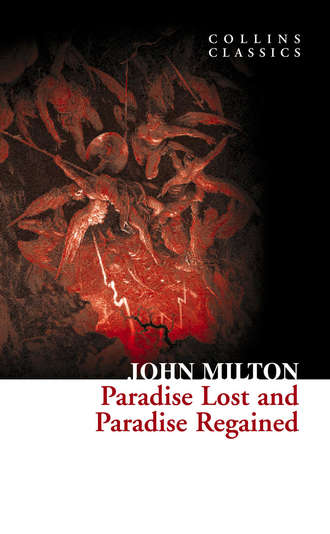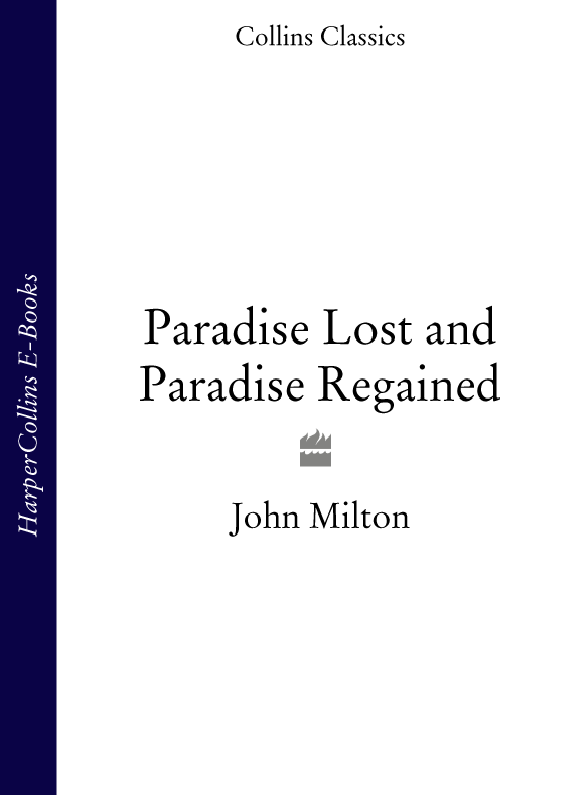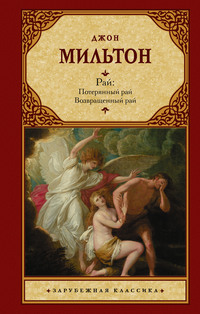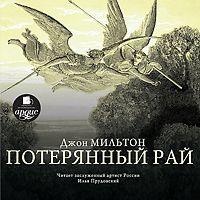
Полная версия
Paradise Lost and Paradise Regained


PARADISE
LOST AND
PARADISE
REGAINED
John Milton

Contents
COVER
TITLE PAGE
PARADISE LOST
BOOK I
BOOK II
BOOK III
BOOK IV
BOOK V
BOOK VI
BOOK VII
BOOK VIII
BOOK IX
BOOK X
BOOK XI
BOOK XII
PARADISE REGAINED
THE FIRST BOOK
THE SECOND BOOK
THE THIRD BOOK
THE FOUR BOOK
CLASSIC LITERATURE: WORDS AND PHRASES ADAPTED FROM THE COLLINS ENGLISH DICTIONARY
ABOUT THE AUTHOR
HISTORY OF COLLINS
COPYRIGHT
ABOUT THE PUBLISHER
BOOK I
Of Man’s first disobedience, and the fruit
Of that forbidden tree whose mortal taste
Brought death into the World, and all our woe,
With loss of Eden, till one greater Man
Restore us, and regain the blissful seat,
Sing, Heavenly Muse, that, on the secret top
Of Oreb, or of Sinai, didst inspire
That shepherd who first taught the chosen seed
In the beginning how the heavens and earth
Rose out of Chaos: or, if Sion hill
Delight thee more, and Siloa’s brook that flowed
Fast by the oracle of God, I thence
Invoke thy aid to my adventurous song,
That with no middle flight intends to soar
Above th’ Aonian mount, while it pursues
Things unattempted yet in prose or rhyme.
And chiefly thou, O Spirit, that dost prefer
Before all temples th’ upright heart and pure,
Instruct me, for thou know’st; thou from the first
Wast present, and, with mighty wings outspread,
Dove-like sat’st brooding on the vast Abyss,
And mad’st it pregnant: what in me is dark
Illumine, what is low raise and support;
That, to the height of this great argument,
I may assert Eternal Providence,
And justify the ways of God to men.
Say first—for Heaven hides nothing from thy view,
Nor the deep tract of Hell—say first what cause
Moved our grand parents, in that happy state,
Favoured of Heaven so highly, to fall off
From their Creator, and transgress his will
For one restraint, lords of the World besides.
Who first seduced them to that foul revolt?
Th’ infernal Serpent; he it was whose guile,
Stirred up with envy and revenge, deceived
The mother of mankind, what time his pride
Had cast him out from Heaven, with all his host
Of rebel Angels, by whose aid, aspiring
To set himself in glory above his peers,
He trusted to have equalled the Most High,
If he opposed, and with ambitious aim
Against the throne and monarchy of God,
Raised impious war in Heaven and battle proud,
With vain attempt. Him the Almighty Power
Hurled headlong flaming from th’ ethereal sky,
With hideous ruin and combustion, down
To bottomless perdition, there to dwell
In adamantine chains and penal fire,
Who durst defy th’ Omnipotent to arms.
Nine times the space that measures day and night
To mortal men, he, with his horrid crew,
Lay vanquished, rolling in the fiery gulf,
Confounded, though immortal. But his doom
Reserved him to more wrath; for now the thought
Both of lost happiness and lasting pain
Torments him: round he throws his baleful eyes,
That witnessed huge affliction and dismay,
Mixed with obdurate pride and steadfast hate.
At once, as far as Angels ken, he views
The dismal situation waste and wild.
A dungeon horrible, on all sides round,
As one great furnace flamed; yet from those flames
No light; but rather darkness visible
Served only to discover sights of woe,
Regions of sorrow, doleful shades, where peace
And rest can never dwell, hope never comes
That comes to all, but torture without end
Still urges, and a fiery deluge, fed
With ever-burning sulphur unconsumed.
Such place Eternal Justice has prepared
For those rebellious; here their prison ordained
In utter darkness, and their portion set,
As far removed from God and light of Heaven
As from the centre thrice to th’ utmost pole.
Oh how unlike the place from whence they fell!
There the companions of his fall, o’erwhelmed
With floods and whirlwinds of tempestuous fire,
He soon discerns; and, weltering by his side,
One next himself in power, and next in crime,
Long after known in Palestine, and named
Beelzebub. To whom th’ Arch-Enemy,
And thence in Heaven called Satan, with bold words
Breaking the horrid silence, thus began:—
“If thou beest he—but O how fallen! how changed
From him who, in the happy realms of light
Clothed with transcendent brightness, didst outshine
Myriads, though bright!—if he whom mutual league,
United thoughts and counsels, equal hope
And hazard in the glorious enterprise
Joined with me once, now misery hath joined
In equal ruin; into what pit thou seest
From what height fallen: so much the stronger proved
He with his thunder; and till then who knew
The force of those dire arms? Yet not for those,
Nor what the potent Victor in his rage
Can else inflict, do I repent, or change,
Though changed in outward lustre, that fixed mind,
And high disdain from sense of injured merit,
That with the Mightiest raised me to contend,
And to the fierce contentions brought along
Innumerable force of Spirits armed,
That durst dislike his reign, and, me preferring,
His utmost power with adverse power opposed
In dubious battle on the plains of Heaven,
And shook his throne. What though the field be lost?
All is not lost—the unconquerable will,
And study of revenge, immortal hate,
And courage never to submit or yield:
And what is else not to be overcome?
That glory never shall his wrath or might
Extort from me. To bow and sue for grace
With suppliant knee, and deify his power
Who, from the terror of this arm, so late
Doubted his empire—that were low indeed;
That were an ignominy and shame beneath
This downfall; since, by fate, the strength of Gods,
And this empyreal sybstance, cannot fail;
Since, through experience of this great event,
In arms not worse, in foresight much advanced,
We may with more successful hope resolve
To wage by force or guile eternal war,
Irreconcilable to our grand Foe,
Who now triumphs, and in th’ excess of joy
Sole reigning holds the tyranny of Heaven.”
So spake th’ apostate Angel, though in pain,
Vaunting aloud, but racked with deep despair;
And him thus answered soon his bold compeer:—
“O Prince, O Chief of many throned Powers
That led th’ embattled Seraphim to war
Under thy conduct, and, in dreadful deeds
Fearless, endangered Heaven’s perpetual King,
And put to proof his high supremacy,
Whether upheld by strength, or chance, or fate,
Too well I see and rue the dire event
That, with sad overthrow and foul defeat,
Hath lost us Heaven, and all this mighty host
In horrible destruction laid thus low,
As far as Gods and heavenly Essences
Can perish: for the mind and spirit remains
Invincible, and vigour soon returns,
Though all our glory extinct, and happy state
Here swallowed up in endless misery.
But what if he our Conqueror (whom I now
Of force believe almighty, since no less
Than such could have o’erpowered such force as ours)
Have left us this our spirit and strength entire,
Strongly to suffer and support our pains,
That we may so suffice his vengeful ire,
Or do him mightier service as his thralls
By right of war, whate’er his business be,
Here in the heart of Hell to work in fire,
Or do his errands in the gloomy Deep?
What can it the avail though yet we feel
Strength undiminished, or eternal being
To undergo eternal punishment?”
Whereto with speedy words th’ Arch-Fiend replied:—
“Fallen Cherub, to be weak is miserable,
Doing or suffering: but of this be sure—
To do aught good never will be our task,
But ever to do ill our sole delight,
As being the contrary to his high will
Whom we resist. If then his providence
Out of our evil seek to bring forth good,
Our labour must be to pervert that end,
And out of good still to find means of evil;
Which ofttimes may succeed so as perhaps
Shall grieve him, if I fail not, and disturb
His inmost counsels from their destined aim.
But see! the angry Victor hath recalled
His ministers of vengeance and pursuit
Back to the gates of Heaven: the sulphurous hail,
Shot after us in storm, o’erblown hath laid
The fiery surge that from the precipice
Of Heaven received us falling; and the thunder,
Winged with red lightning and impetuous rage,
Perhaps hath spent his shafts, and ceases now
To bellow through the vast and boundless Deep.
Let us not slip th’ occasion, whether scorn
Or satiate fury yield it from our Foe.
Seest thou yon dreary plain, forlorn and wild,
The seat of desolation, void of light,
Save what the glimmering of these livid flames
Casts pale and dreadful? Thither let us tend
From off the tossing of these fiery waves;
There rest, if any rest can harbour there;
And, re-assembling our afflicted powers,
Consult how we may henceforth most offend
Our enemy, our own loss how repair,
How overcome this dire calamity,
What reinforcement we may gain from hope,
If not, what resolution from despair.”
Thus Satan, talking to his nearest mate,
With head uplift above the wave, and eyes
That sparkling blazed; his other parts besides
Prone on the flood, extended long and large,
Lay floating many a rood, in bulk as huge
As whom the fables name of monstrous size,
Titanian or Earth-born, that warred on Jove,
Briareos or Typhon, whom the den
By ancient Tarsus held, or that sea-beast
Leviathan, which God of all his works
Created hugest that swim th’ ocean-stream.
Him, haply slumbering on the Norway foam,
The pilot of some small night-foundered skiff,
Deeming some island, oft, as seamen tell,
With fixed anchor in his scaly rind,
Moors by his side under the lee, while night
Invests the sea, and wished morn delays.
So stretched out huge in length the Arch-fiend lay,
Chained on the burning lake; nor ever thence
Had risen, or heaved his head, but that the will
And high permission of all-ruling Heaven
Left him at large to his own dark designs,
That with reiterated crimes he might
Heap on himself damnation, while he sought
Evil to others, and enraged might see
How all his malice served but to bring forth
Infinite goodness, grace, and mercy, shewn
On Man by him seduced, but on himself
Treble confusion, wrath, and vengeance poured.
Forthwith upright he rears from off the pool
His mighty stature; on each hand the flames
Driven backward slope their pointing spires, and rolled
In billows, leave i’ th’ midst a horrid vale.
Then with expanded wings he steers his flight
Aloft, incumbent on the dusky air,
That felt unusual weight; till on dry land
He lights—if it were land that ever burned
With solid, as the lake with liquid fire,
And such appeared in hue as when the force
Of subterranean wind transports a hill
Torn from Pelorus, or the shattered side
Of thundering Etna, whose combustible
And fuelled entrails, thence conceiving fire,
Sublimed with mineral fury, aid the winds,
And leave a singed bottom all involved
With stench and smoke. Such resting found the sole
Of unblest feet. Him followed his next mate;
Both glorying to have scaped the Stygian flood
As gods, and by their own recovered strength,
Not by the sufferance of supernal Power.
“Is this the region, this the soil, the clime,”
Said then the lost Archangel, “this the seat
That we must change for Heaven?—this mournful gloom
For that celestial light? Be it so, since he
Who now is sovereign can dispose and bid
What shall be right: farthest from him is best
Whom reason hath equalled, force hath made supreme
Above his equals. Farewell, happy fields,
Where joy for ever dwells! Hail, horrors! hail,
Infernal world! and thou, profoundest Hell,
Receive thy new possessor—one who brings
A mind not to be changed by place or time.
The mind is its own place, and in itself
Can make a Heaven of Hell, a Hell of Heaven.
What matter where, if I be still the same,
And what I should be, all but less than he
Whom thunder hath made greater? Here at least
We shall be free; th’ Almighty hath not built
Here for his envy, will not drive us hence:
Here we may reign secure; and, in my choice,
To reign is worth ambition, though in Hell:
Better to reign in Hell than serve in Heaven.
But wherefore let we then our faithful friends,
Th’ associates and co-partners of our loss,
Lie thus astonished on th’ oblivious pool,
And call them not to share with us their part
In this unhappy mansion, or once more
With rallied arms to try what may be yet
Regained in Heaven, or what more lost in Hell?”
So Satan spake; and him Beelzebub
Thus answered:—“Leader of those armies bright
Which, but th’ Omnipotent, none could have foiled!
If once they hear that voice, their liveliest pledge
Of hope in fears and dangers—heard so oft
In worst extremes, and on the perilous edge
Of battle, when it raged, in all assaults
Their surest signal—they will soon resume
New courage and revive, though now they lie
Grovelling and prostrate on yon lake of fire,
As we erewhile, astounded and amazed;
No wonder, fallen such a pernicious height!”
He scare had ceased when the superior Fiend
Was moving toward the shore; his ponderous shield,
Ethereal temper, massy, large, and round,
Behind him cast. The broad circumference
Hung on his shoulders like the moon, whose orb
Through optic glass the Tuscan artist views
At evening, from the top of Fesole,
Or in Valdarno, to descry new lands,
Rivers, or mountains, in her spotty globe.
His spear—to equal which the tallest pine
Hewn on Norwegian hills, to be the mast
Of some great ammiral, were but a wand—
He walked with, to support uneasy steps
Over the burning marl, not like those steps
On Heaven’s azure; and the torrid clime
Smote on him sore besides, vaulted with fire.
Nathless he so endured, till on the beach
Of that inflamed sea he stood, and called
His legions—Angel Forms, who lay entranced
Thick as autumnal leaves that strow the brooks
In Vallombrosa, where th’ Etrurian shades
High over-arched embower; or scattered sedge
Afloat, when with fierce winds Orion armed
Hath vexed the Red-Sea coast, whose waves o’erthrew
Busiris and his Memphian chivalry,
While with perfidious hatred they pursued
The sojourners of Goshen, who beheld
From the safe shore their floating carcases
And broken chariot-wheels. So thick bestrown,
Abject and lost, lay these, covering the flood,
Under amazement of their hideous change.
He called so loud that all the hollow deep
Of Hell resounded:—“Princes, Potentates,
Warriors, the Flower of Heaven—once yours; now lost,
If such astonishment as this can seize
Eternal Spirits! Or have ye chosen this place
After the toil of battle to repose
Your wearied virtue, for the ease you find
To slumber here, as in the vales of Heaven?
Or in this abject posture have ye sworn
To adore the Conqueror, who now beholds
Cherub and Seraph rolling in the flood
With scattered arms and ensigns, till anon
His swift pursuers from Heaven-gates discern
Th’ advantage, and, descending, tread us down
Thus drooping, or with linked thunderbolts
Transfix us to the bottom of this gulf?
Awake, arise, or be for ever fallen!”
They heard, and were abashed, and up they sprung
Upon the wing, as when men wont to watch
On duty, sleeping found by whom they dread,
Rouse and bestir themselves ere well awake.
Nor did they not perceive the evil plight
In which they were, or the fierce pains not feel;
Yet to their General’s voice they soon obeyed
Innumerable. As when the potent rod
Of Amram’s son, in Egypt’s evil day,
Waved round the coast, up-called a pitchy cloud
Of locusts, warping on the eastern wind,
That o’er the realm of impious Pharaoh hung
Like Night, and darkened all the land of Nile;
So numberless were those bad Angels seen
Hovering on wing under the cope of Hell,
‘Twixt upper, nether, and surrounding fires;
Till, as a signal given, th’ uplifted spear
Of their great Sultan waving to direct
Their course, in even balance down they light
On the firm brimstone, and fill all the plain:
A multitude like which the populous North
Poured never from her frozen loins to pass
Rhene or the Danaw, when her barbarous sons
Came like a deluge on the South, and spread
Beneath Gibraltar to the Libyan sands.
Forthwith, form every squadron and each band,
The heads and leaders thither haste where stood
Their great Commander—godlike Shapes, and Forms
Excelling human; princely Dignities;
And Powers that erst in Heaven sat on thrones,
Though on their names in Heavenly records now
Be no memorial, blotted out and rased
By their rebellion from the Books of Life.
Nor had they yet among the sons of Eve
Got them new names, till, wandering o’er the earth,
Through God’s high sufferance for the trial of man,
By falsities and lies the greatest part
Of mankind they corrupted to forsake
God their Creator, and th’ invisible
Glory of him that made them to transform
Oft to the image of a brute, adorned
With gay religions full of pomp and gold,
And devils to adore for deities:
Then were they known to men by various names,
And various idols through the heathen world.
Say, Muse, their names then known, who first, who last,
Roused from the slumber on that fiery couch,
At their great Emperor’s call, as next in worth
Came singly where he stood on the bare strand,
While the promiscuous crowd stood yet aloof?
The chief were those who, from the pit of Hell
Roaming to seek their prey on Earth, durst fix
Their seats, long after, next the seat of God,
Their altars by his altar, gods adored
Among the nations round, and durst abide
Jehovah thundering out of Sion, throned
Between the Cherubim; yea, often placed
Within his sanctuary itself their shrines,
Abominations; and with cursed things
His holy rites and solemn feasts profaned,
And with their darkness durst affront his light.
First, Moloch, horrid king, besmeared with blood
Of human sacrifice, and parents’ tears;
Though, for the noise of drums and timbrels loud,
Their children’s cries unheard that passed through fire
To his grim idol. Him the Ammonite
Worshiped in Rabba and her watery plain,
In Argob and in Basan, to the stream
Of utmost Arnon. Nor content with such
Audacious neighbourhood, the wisest heart
Of Solomon he led by fraud to build
His temple right against the temple of God
On that opprobrious hill, and made his grove
The pleasant valley of Hinnom, Tophet thence
And black Gehenna called, the type of Hell.
Next Chemos, th’ obscene dread of Moab’s sons,
From Aroer to Nebo and the wild
Of southmost Abarim; in Hesebon
And Horonaim, Seon’s realm, beyond
The flowery dale of Sibma clad with vines,
And Elealè to th’ Asphaltic Pool:
Peor his other name, when he enticed
Israel in Sittim, on their march from Nile,
To do him wanton rites, which cost them woe.
Yet thence his lustful orgies he enlarged
Even to that hill of scandal, by the grove
Of Moloch homicide, lust hard by hate,
Till good Josiah drove them thence to Hell.
With these came they who, from the bordering flood
Of old Euphrates to the brook that parts
Egypt from Syrian ground, had general names
Of Baalim and Ashtaroth—those male,
These feminine. For Spirits, when they please,
Can either sex assume, or both; so soft
And uncompounded is their essence pure,
Not tried or manacled with joint or limb,
Nor founded on the brittle strength of bones,
Like cumbrous flesh; but, in what shape they choose,
Dilated or condensed, bright or obscure,
Can execute their airy purposes,
And works of love or enmity fulfil.
For those the race of Israel oft forsook
Their Living Strength, and unfrequented left
His righteous altar, bowing lowly down
To bestial gods; for which their heads as low
Bowed down in battle, sunk before the spear
Of despicable foes. With these in troop
Came Astoreth, whom the Phoenicians called
Astartè, queen of heaven, with crescent horns;
To whose bright image nightly by the moon
Sidonian virgins paid their vows and songs;
In Sion also not unsung, where stood
Her temple on th’ offensive mountain, built









